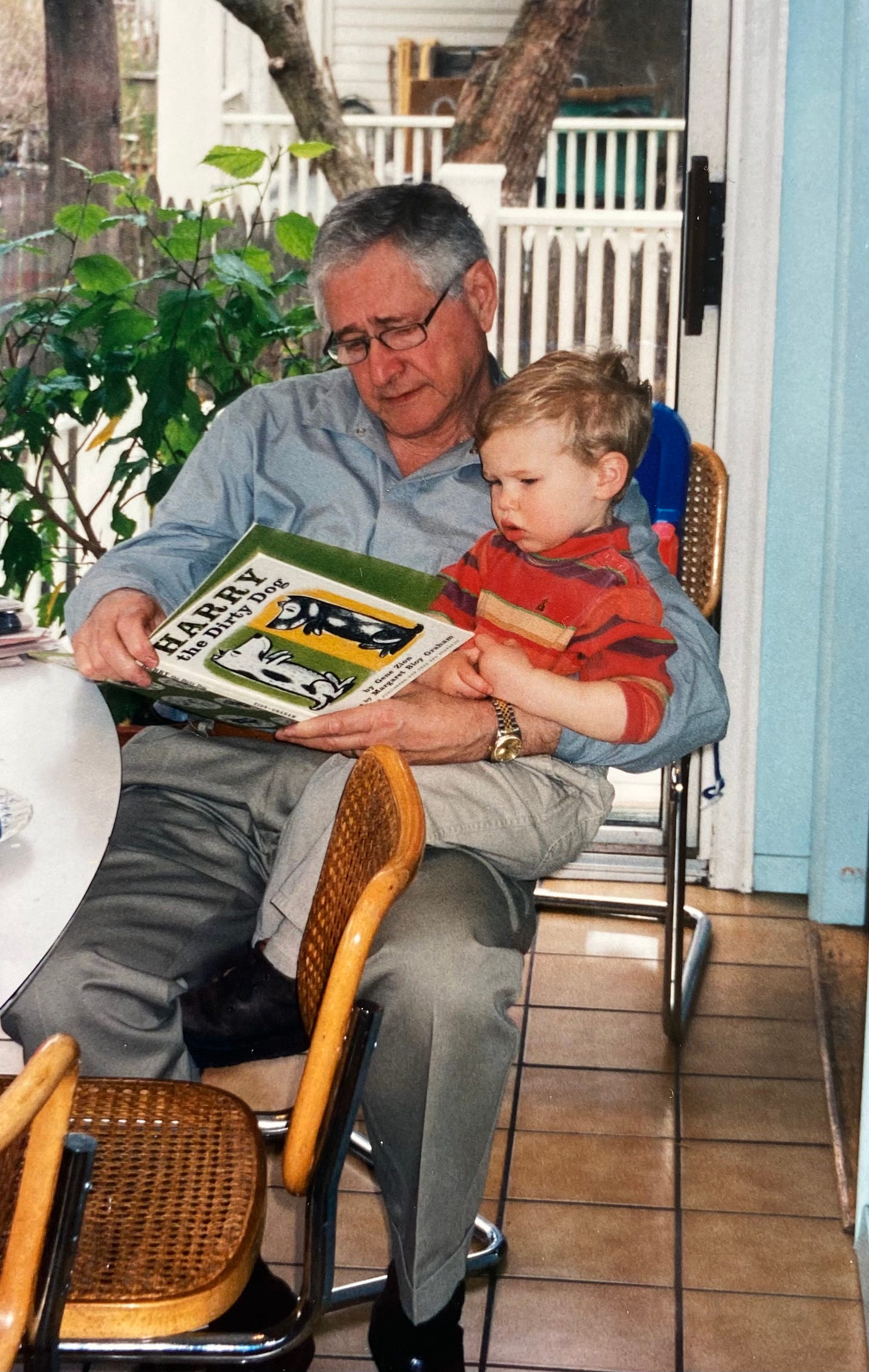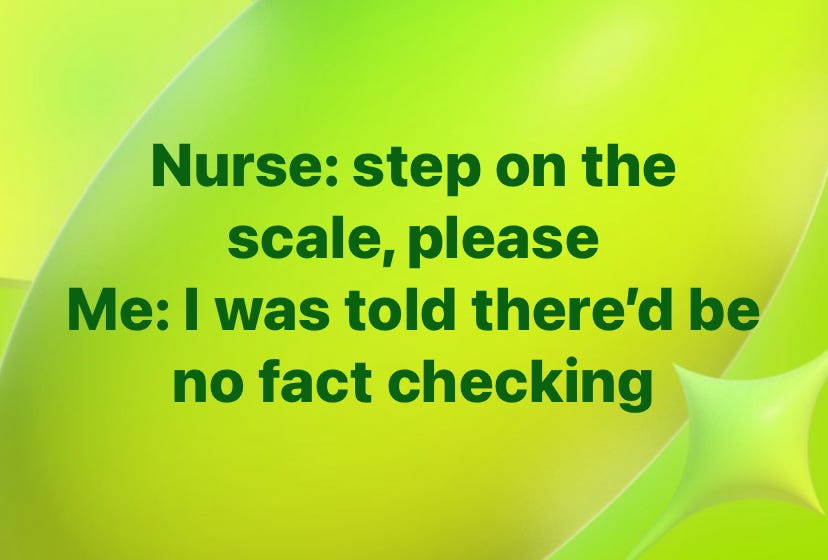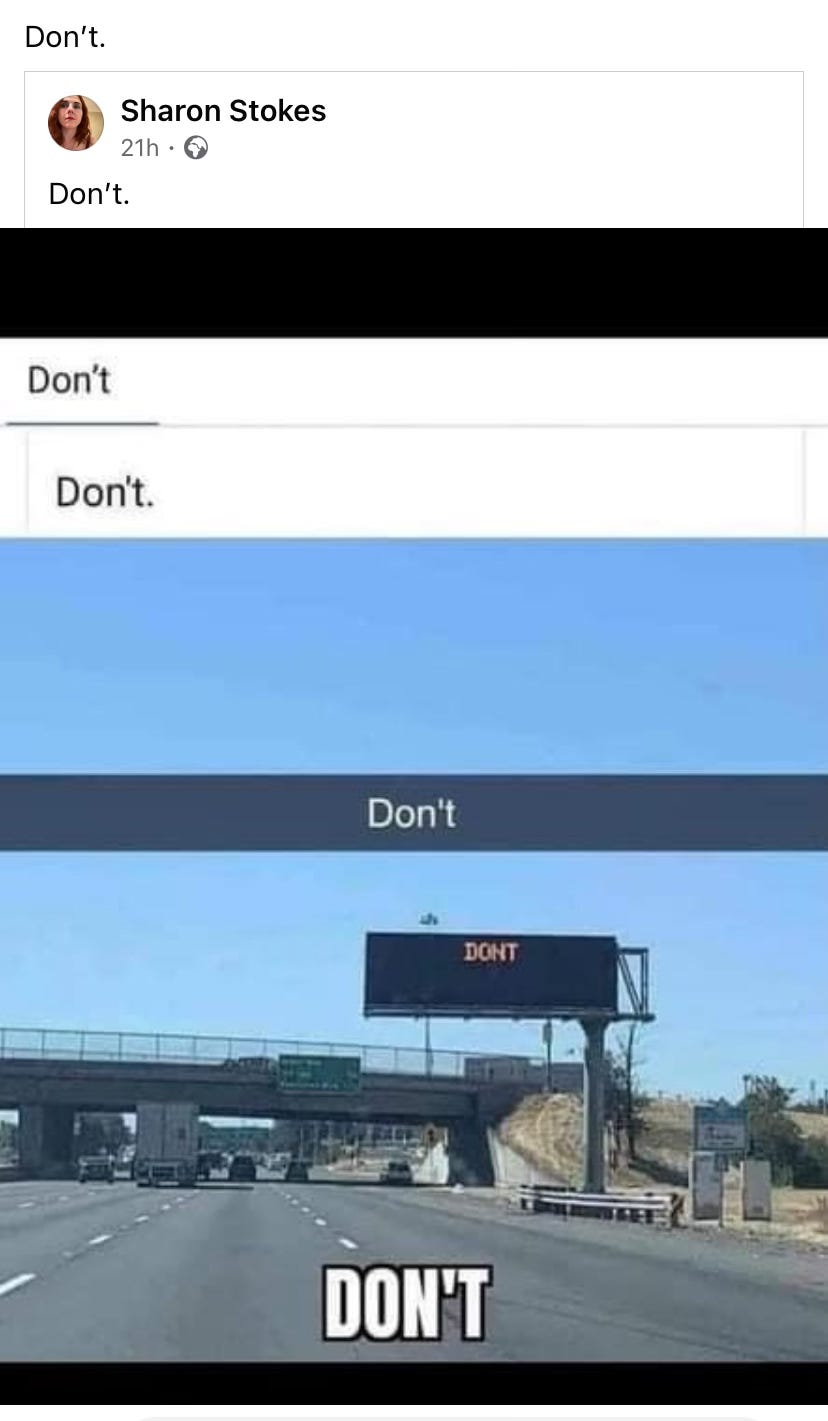One summer when I was eleven, a storm ripped through our neighborhood, and the next morning we awoke to a yard strewn with sticks. Some family friends came over for lunch, and my dad gathered me, my brother, and our friends’ kids in the front yard. He told us that there was an important contest going on to determine who could gather the most sticks in one minute. This lit a fire under us! We darted around the yard, grabbing as many sticks as we could carry and dumping them in front of my dad. He called “Time!” and told us that there was also a contest with a two-minute time limit, and off we went. And so on, until the yard was stick-free.
Of course there wasn’t actually a contest.1 My dad lied to us. But imagine if he had told us the unvarnished truth: “There is a huge mess out in the yard, and you are required to clean it up before lunch.” Or imagine the “gentle parenting” approach: “Doesn’t it feel sad and icky to have so many sticks in the yard? Don’t we want to pick up the sticks? Won’t we be proud of ourselves?” (And then the kids would say they didn’t actually want to pick up the sticks, and the adults would be stuck with the chore.) Turns out that when you want to get your kids to clean up the yard, a lie is not only more effective but also a lot more fun than typical parenting methods.
Or here’s a more serious story. Our son, Noah, had a lovely, special bond with his paternal grandpa, Jerry. Jerry delighted in sneaking baby Noah little treats—a spoonful of tiramisu, say—when our backs were turned. As a toddler, Noah would “help” Jerry with the garden, the two of them would go for quiet walks together, and Jerry was the only person in Noah’s life who never lost patience with Noah’s seemingly inexhaustible desire for books about trucks. After we moved away, Jerry would sometimes get a hankering to see Noah, and so he’d drive four hours to our house, take Noah to the park, come back for lunch, read Noah a story, and then drive the four hours back home.
When Noah was two, Jerry was diagnosed with lung cancer, and he died a few months later. Noah was heartbroken about his grandpa, and he became afraid that my husband and I would die too. We asked a psychiatrist friend for help. He said that while some experts might recommend an honest, in-depth conversation about death, in his opinion it would be better with a child Noah’s age just to say, “We are young, and young people don’t die.” And so that’s what we said. Yes, it was a lie, but it was also the best way to reassure a grieving, frightened toddler.
. . . But Most Americans Are Not Our Kids
I lured you in with my stories to make a larger point. Maybe we can agree that it’s ok to lie to our kids when they are too young to cope with the full truth. However, most Americans are adults who deserve our honesty. Too often, those in power don’t believe that we would do the right thing if we knew the truth, and so they employ the “noble lie”—“a myth or a lie propagated by the elite to maintain social harmony.” These lies not only corrode social trust, but they tend to backfire.
We saw this happen during the pandemic. For example, I think that health authorities and the mainstream media wanted to incentivize people to stay home to stop Covid from spreading. This was a worthy cause. They could have spoken frankly with the American people, reassured us, and trusted us to protect ourselves and our vulnerable loved ones. Instead, official pronouncements and news reports stressed that everyone was at risk, when in fact it was clear early on that most people, especially people below age fifty, would be safe.
This noble lie, that Covid was a pervasive threat, helped to justify such extreme measures as closing parks, businesses, and schools for months or even years. The school closures have imposed devastating costs on a generation of children, including chronic absenteeism, learning loss, increased depression and anxiety, and delayed social development. Anger over business closures has torn the country apart, and too many Americans no longer trust scientific expertise.
It didn’t have to be this way. In Switzerland, where I live, the health authorities rejected the noble lie. Throughout the pandemic, they were honest about what they knew, they updated the rules as conditions changed, and they told us why. As a result of this culture of trust, most people were responsible and followed the rules. Switzerland had one of the lowest per capita excess death rates in the world, while also protecting the economy, children’s educations, and everyone’s mental health.2 (I wrote about Switzerland’s remarkably successful approach to the pandemic here.)
Whenever I bring up how well Switzerland did during the pandemic, American friends object that Switzerland, unlike the US, is a high-trust society, and that “that could never work here.” But why didn’t we at least try? After all, the way we build a culture of trust is to trust people, to give them correct information about conditions, to share updates when the situation changes, and to believe that most people, most of the time, will do the right thing. By contrast, lies—noble or otherwise—perpetuate the vicious cycle of divisiveness and distrust.
Speaking of ignoble lies, there are also people out there who lie to gain political power. There is a reason that “Machiavellian” is not a compliment. Some politicians, well aware that no one would vote for them if they were up front about the policies they would enact in office, lie to us about what they would do. To wit, J.D. Vance at the debate a couple of weeks ago. Vance’s objection to normal fact-checking has unleashed a torrent of memes.
Or there’s this one, to which many of us can relate:
To paraphrase Mary McCarthy, every word Vance said in the debate was a lie, including “and” and “the.” But let’s take a look at the most egregious one, about Trump’s record on Obamacare. Vance is no dummy; he knows that the Affordable Care Act is very popular, especially the rule that prevents insurance companies from denying coverage to people with “pre-existing conditions.”3 So he knew he couldn’t say that Trump will obliterate Americans’ healthcare coverage and replace it with “concepts of a plan”—not if he wants to win. So he lied. I got a kick out of this take-down of Vance’s claim that Trump “salvaged” Obamacare, and maybe you will too:
This is the opposite of what happened: Trump tried to repeal Obamacare, and when he failed, he repealed the part of the law that helped the pre-existing-conditions-coverage-for-healthy-plan-members trade work. Trump did everything in his power to weaken Obamacare and still talks about it in much the same language that ancient sailors probably used to talk about the Kraken. But in Vance’s telling of the story, Trump was the fat orange line protecting Obamacare from ruin. . . . [I]t was as if Johnnie Cochran had showed up in court and argued that Nicole Brown Simpson killed O.J.
We are rational adults, not fearful and confused children. We need the truth in order to make the best decisions for ourselves and our families. If a candidate has to lie because he can’t win on the merits of his positions, then perhaps he doesn’t deserve to be our president.
How about you, readers? Have you ever lied to your kids? What happened? And how can we help to build a culture of trust in our country? What can we do when politicians lie to us? Please share your thoughts in the comments!
The Tidbit
I have no idea why the meme below cracks me up, but it does. If we are ever tempted to use the noble lie to manipulate someone who is not our young child, just
Don’t.
As the oldest kid by a few years, I had cottoned on to my dad’s plan from the beginning, but I went along with it just for fun. Besides, at the end of the “contest,” my dad gave us all prizes.
Excess deaths is a better measure of a country’s performance during the pandemic than Covid deaths, because pandemic restrictions also caused deaths, from missed medical care and from increased murders, suicides, and overdoses.
This article reports on excess deaths in the thirty-four countries with the most reliable health data from 2020 to 2023. Switzerland, which had minimal pandemic restrictions, had 207 excess deaths per million from 2020-23, while the figure in the US was 3665.
Incidentally, the country with the second-lowest excess deaths per million was Sweden. Sweden faced harsh criticism at the start of the pandemic for its decision to protect seniors and vulnerable people but otherwise to allow its citizens to go about their lives. We now know that Sweden, like Switzerland, did much better than most countries that had imposed draconian restrictions.
Every family has a story about this. Here’s ours: When my brother was in his early twenties, he tore his ACL playing basketball. His insurance company denied payment for the surgery, citing a pre-existing condition. The alleged “pre-existing condition”? A decade earlier, my brother had had an inflammation in his tibia (i.e. not his ACL; not even his knee). Our mom spent dozens of stressful, frustrating hours arguing with the insurance company. She eventually had to call the state Attorney General to resolve the issue. No one wants to go back to the wasted hours, catastrophic bills, and needless suffering of the days before the Affordable Care Act.








The only glimmer of silver lining to the COVID mishandling was that the children who are forever affected by the lockdowns serve as evidence that Silicon Valley's fever dream to have us all live in VR helmets is not a replacement for actual natural socializing, therefore a terrible idea, and ought to be nipped in the bud.
And that's the only good that came out of it all. Botching social capital and goodwill has made us that much less prepared for the next once-in-a-century pandemic.
I agree with you Mari. Covid was such a missed opportunity for real leadership in the U.S. As you say, if people are lied to, especially by the government, and especially if they're suspicious of the government anyway, they lose even more of their trust and stop believing the truth. Covid could have been a pull-together moment for the U.S. and instead it split the country even farther apart. I'm not sure if the solution was fewer restrictions (we disagree on that, but I see your point), but more truth, or even...all truth surely would have helped. Nice column!